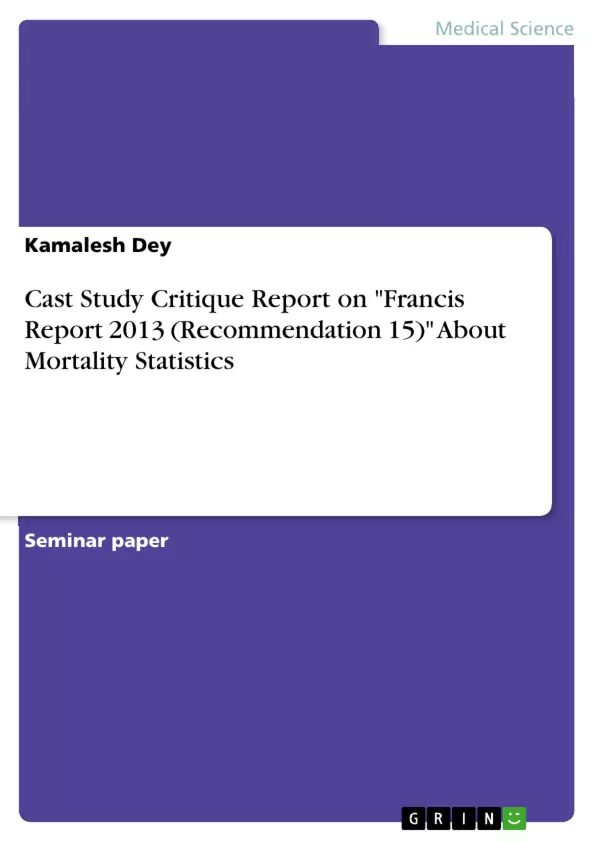The report explored the Francis report regarding Mid Staffordshire NHS Foundation. The report also examined and analysed the recommendation 15 of Francis report based on Mid Staffordshire NHS Foundation. The report mainly highlighted the mortality statistics of the Mid Staffordshire NHS Foundation and how mortality statistics influenced the entire hospital as well as NHS foundation trust through the different performance strategies. Mortality statistics was done through data collection, data analysis, assessing hospital performance, and publishing the final audit report, while the report highlighted that auditing was the best strategy to improve the total performance of the hospital.
In addition, the critique report recommended seven principles for medical auditing for instances clinical and health providers individual’s duty, self-management of the medical staffs, availabilities of the auditing, essential criteria of the auditing, required resources of the medical auditing, record keeping, and evaluation of the final audit outcomes by various medical and non-medical experts. These seven principles were identified as effective and significant to provide the quality care of the patients and improve the overall performances of the medical organisations.
Table of Contents
- EXECUTIVE SUMMARY
- CONTENT
- INTRODUCTION
- ANALYSIS
- DATA COLLECTION
- DATA ANALYSIS
- ASSESSING HOSPITAL PERFORMANCE
- PUBLISHING FINAL OUTCOMES
- CONCLUSIONS
- RECOMMENDATIONS
- REFERENCES
- BIBLIOGRAPHY
- APPENDIX
- APPENDIX 1: MIND MAP OF FRANCIS REPORT
Objectives and Key Themes
This report examines the Francis report concerning the Mid Staffordshire NHS Foundation Trust, specifically focusing on recommendation 15 regarding mortality statistics. It aims to analyze how mortality statistics can be utilized as a tool to improve hospital performance through data collection, analysis, performance assessment, and publication of findings. The report explores the effectiveness of these strategies in addressing the quality of care issues highlighted by the Francis report.
- The impact of mortality statistics on hospital performance
- The role of data collection, analysis, and performance assessment in improving patient care
- The importance of publishing mortality statistics to enhance transparency and accountability
- The effectiveness of recommendation 15 in addressing the issues raised by the Francis report
- Strategies for implementing effective mortality statistics protocols within the NHS
Chapter Summaries
The report begins by introducing the Francis report and its findings regarding the Mid Staffordshire NHS Foundation Trust, highlighting the significance of recommendation 15 on mortality statistics. It then delves into an analysis of this recommendation, exploring how mortality statistics can be used to improve hospital performance through data collection, analysis, performance assessment, and publication of outcomes. The report examines the effectiveness of these strategies in addressing the quality of care issues raised by the Francis report and discusses the potential for their implementation within the NHS.
Keywords
The report focuses on the key concepts of mortality statistics, quality of care, hospital performance, data collection, data analysis, performance assessment, publication of outcomes, and the Francis report. It specifically examines recommendation 15 of the Francis report, which addresses the use of mortality statistics as a tool for improving hospital performance and patient care.
Frequently Asked Questions
What is the Francis Report 2013?
The Francis Report is an inquiry into the serious failings in care at the Mid Staffordshire NHS Foundation Trust, highlighting systemic issues in the NHS.
What does Recommendation 15 of the Francis Report address?
Recommendation 15 focuses on the use of mortality statistics as a vital tool for auditing and improving hospital performance and patient safety.
How can mortality statistics improve hospital performance?
By collecting and analyzing data, hospitals can identify patterns of poor care, assess performance against benchmarks, and implement corrective strategies.
What are the seven principles for medical auditing mentioned in the report?
The principles include individual duty, self-management, availability of auditing, essential criteria, required resources, record keeping, and expert evaluation.
Why is publishing final audit outcomes important?
Transparency through publication enhances accountability and allows the public to see the actual quality of care provided by medical organizations.
- Quote paper
- Mr Kamalesh Dey (Author), 2016, Cast Study Critique Report on "Francis Report 2013 (Recommendation 15)" About Mortality Statistics, Munich, GRIN Verlag, https://www.grin.com/document/333870



